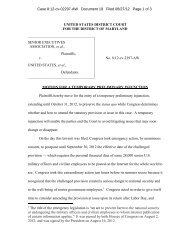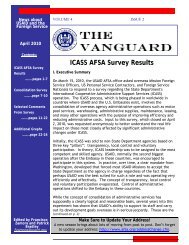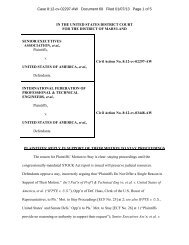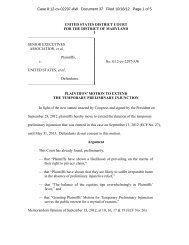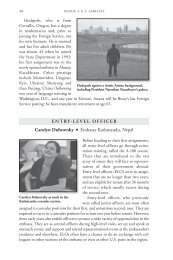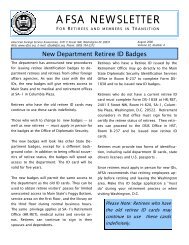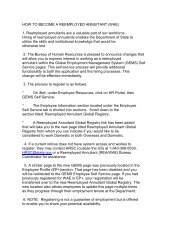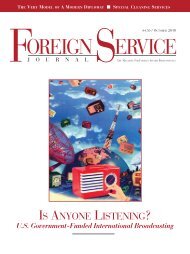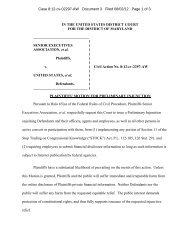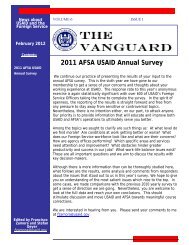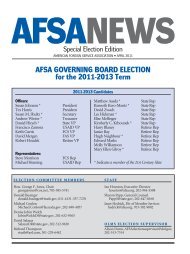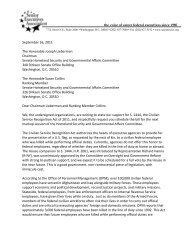F OCUS - American Foreign Service Association
F OCUS - American Foreign Service Association
F OCUS - American Foreign Service Association
You also want an ePaper? Increase the reach of your titles
YUMPU automatically turns print PDFs into web optimized ePapers that Google loves.
authority and against the advice of<br />
almost all his colleagues to go to<br />
Moscow to negotiate with the Kremlin.<br />
He was warmly welcomed by<br />
Brezhnev, who used Svoboda’s presence<br />
to convince thousands of Russians<br />
watching their caravan come up<br />
Leninskiy Prospekt in Moscow that<br />
Soviet forces had rescued socialism<br />
from its enemies.<br />
Svoboda returned to Prague on<br />
Aug. 27, bringing back the kidnapped<br />
leaders but also a bilateral “agreement”<br />
that was immediately recognized<br />
by a shocked country as total<br />
capitulation. Dubcek, having convinced<br />
himself that he could help stave<br />
off the worst, became a reluctant collaborator<br />
in a process known as “normalization.”<br />
Josef Smrkovsky, now<br />
chairman of the Czechoslovak Parliament,<br />
told the truth to the end, arguing<br />
for Czechoslovak national unity —<br />
but the Soviets saw this as a code<br />
name for resistance. They isolated<br />
and ultimately disposed of him.<br />
It nevertheless required a provocation<br />
adroitly organized by the Czech<br />
Ministry of the Interior to force the<br />
resignation of Dubcek as the last symbol<br />
of the Prague Spring. The Czech<br />
security forces, in conjunction with the<br />
KGB, took advantage of a huge patriotic<br />
demonstration in the heart of<br />
Prague in late March 1969 to smash<br />
and destroy the Aeroflot and Intourist<br />
offices in Prague, an act to which I was<br />
an eyewitness. Dubcek was replaced<br />
in April, after 15 months as first secretary<br />
of the party, by Gustav Husak,<br />
another Slovak and a self-styled realist<br />
who had played a “Slovak card” to<br />
undermine the last vestiges of the<br />
Prague Spring.<br />
The Embassy<br />
During the Crisis<br />
Our small embassy (10 FSOs, two<br />
military attachés, a small CIA station,<br />
secretaries, communicators and Marine<br />
guards) had been a main target in<br />
the gloomy second half of 1967, when<br />
56 FOREIGN SERVICE JOURNAL/JULY-AUGUST 2008<br />
The reaction of<br />
individuals at the top<br />
level of the U.S.<br />
government to the<br />
August events was not<br />
a shining moment of<br />
<strong>American</strong> diplomacy.<br />
its mission of building bridges to<br />
Czechoslovakia was impeded by the<br />
regime’s need to find a foreign culprit<br />
for its internal problems. Even in<br />
1968 things were not much better, as<br />
the largely unreformed Czechoslovak<br />
<strong>Foreign</strong> Ministry — which U.S.<br />
Ambassador Jacob Beam rightly<br />
termed “mischief-making” — tried to<br />
pacify Moscow by accentuating differences<br />
with the United States.<br />
Czechoslovakia continued to be the<br />
number-three purveyor of military<br />
assistance to North Vietnam and helpfully<br />
organized disruptive protests<br />
around the embassy. But<br />
through quiet diplomacy, the embassy<br />
had nevertheless been building<br />
bridges to economic reformers, intellectuals<br />
and other receptive progressives.<br />
The informed population regarded<br />
us as friends.<br />
The embassy covered the invasion<br />
on the streets of Prague from the first<br />
report that Soviet aircraft (250 of<br />
them, landing audibly one minute<br />
apart) were transporting troops and<br />
armor to crush the Prague Spring. We<br />
were on the street well before dawn<br />
on Aug. 21, and throughout the invasion,<br />
to provide the department with<br />
timely first-hand reporting on what<br />
was transpiring, particularly the mag-<br />
nificent passive resistance of the population.<br />
Our primary obligation was to<br />
<strong>American</strong> citizens, of course. Those<br />
few embassy wives still in Prague,<br />
including mine, opened the embassy<br />
commissary to feed hungry citizens<br />
flocking there. Many were billeted by<br />
our Marines. On Aug. 22, the embassy<br />
organized a convoy to deliver<br />
<strong>American</strong> citizens to the West German<br />
border. Hundreds remained,<br />
however, and the <strong>Foreign</strong> Ministry<br />
was unwilling or unable to help. The<br />
airport was closed, and the main railway<br />
station occupied by Soviet troops.<br />
At the request of Amb. Beam, I<br />
placed a direct phone call later that<br />
day to a vice minister of transport with<br />
whom I was acquainted. By luck I got<br />
him on the line and asked for a special<br />
train to take out <strong>American</strong>s and other<br />
foreigners. I thought he would inquire<br />
if I knew there was a war on.<br />
Instead, he responded affirmatively<br />
but said the train would have to depart<br />
southward from an alternate station.<br />
Our stalwart consular section organized<br />
the evacuation of those wishing<br />
to travel, and the train rescued hundreds<br />
of trapped and worried citizens<br />
and foreigners alike.<br />
Our reward came in the wee hours<br />
of Aug. 26, 1968, when we learned<br />
that the attic of the chancery — where<br />
most of us also resided — was on fire.<br />
The Prague fire department could not<br />
help because of a Soviet curfew prohibiting<br />
any movement by night. With<br />
the leadership of a single gallant<br />
seabee and a solitary fire hose, supplemented<br />
by a bucket brigade up slippery,<br />
smoke-filled stairs, we battled for<br />
three hours in the darkness to save the<br />
chancery from destruction while our<br />
dependents waited outside, ready to<br />
evacuate the premises if necessary.<br />
Washington, Moscow<br />
and Prague<br />
The reaction of individuals at the<br />
top level of the U.S. government to




